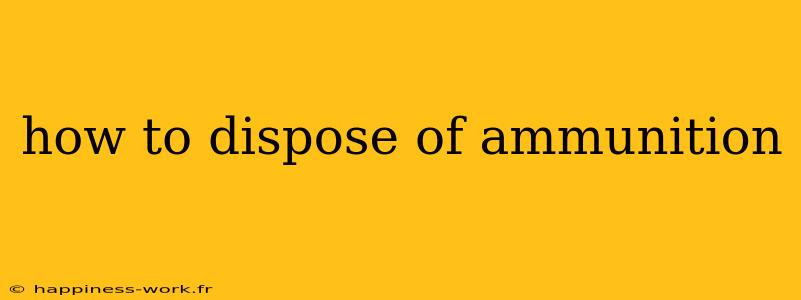Disposing of ammunition can be a sensitive topic, as improper disposal can lead to environmental hazards and even accidents. It's crucial to follow legal and safety guidelines to ensure that ammunition is disposed of safely. Below is a comprehensive guide that answers common questions and provides practical examples for responsible disposal, ensuring you're well-informed.
Table of Contents
- Why is Safe Disposal Important?
- How to Identify Types of Ammunition
- What Are the Best Methods to Dispose of Ammunition?
- Frequently Asked Questions
- Conclusion
Why is Safe Disposal Important?
Improperly disposing of ammunition poses several risks:
- Safety Hazards: Live rounds can pose a danger to those who may unknowingly come across them. They may accidentally fire, causing injuries or fatalities.
- Environmental Concerns: Ammunition contains materials that can be harmful to the environment if they leach into the soil or water supply.
- Legal Issues: Many jurisdictions have laws regulating the disposal of ammunition. Ignoring these laws can lead to fines or other legal repercussions.
Additional Explanation
Safe disposal not only ensures personal safety but also protects the community and environment. Recycling old ammunition can contribute to sustainability efforts, minimizing the ecological footprint of shooting sports.
How to Identify Types of Ammunition
Identifying the type of ammunition you have is essential before disposal. The two main categories include:
- Live Rounds: Ammunition that is fully intact and can be fired.
- Duds: Rounds that have failed to fire and may still be hazardous.
Practical Examples
A .22 caliber bullet is typically used in rifles and pistols, while shotgun shells can vary in size and design. Knowing what you have will help you choose the most appropriate disposal method.
What Are the Best Methods to Dispose of Ammunition?
The most responsible ways to dispose of ammunition include:
-
Local Law Enforcement or Fire Department: Many police and fire departments offer disposal programs for unwanted ammunition. Contact your local agency for information about their services.
-
Military Installation: If you live near a military base, they may provide resources for safely disposing of live ammunition.
-
Licensed Ammunition Dealer: Some dealers may offer to take back old ammunition for proper disposal. Always call ahead to confirm.
-
Specialized Disposal Events: Look for community events focusing on hazardous waste disposal. Often, these events provide a safe environment to discard ammunition.
-
Recycling Facilities: Some recycling centers have programs specifically for metals, including ammunition. Confirm they accept ammunition before proceeding.
Added Value
It's essential to avoid throwing ammunition in the trash or burying it in your yard. In the trash, they could potentially cause harm if they were to be accidentally triggered. Burying ammunition doesn't eliminate its risk and may even lead to contamination of the ground.
Frequently Asked Questions
Q: Can I store old ammunition until I can dispose of it?
A: It's recommended to store ammunition in a cool, dry place away from children and pets until you can properly dispose of it.
Q: Is it safe to destroy ammunition myself?
A: No, attempting to disassemble or destroy ammunition can be extremely dangerous and is not recommended.
Q: What should I do if I find abandoned ammunition?
A: Treat it as if it were live ammunition. Do not touch it and contact local law enforcement for assistance.
Q: Are there age restrictions for disposing of ammunition?
A: Yes, you typically need to be of legal age and possess necessary licenses for handling ammunition in most jurisdictions.
Conclusion
Disposing of ammunition safely requires knowledge and respect for the laws and guidelines in your area. By using local resources, contacting authorities, and participating in community disposal events, you can ensure that your ammunition is handled responsibly. This not only safeguards your immediate environment but also contributes to a larger cultural responsibility regarding firearms and safety.
By following the methods outlined above, you ensure that you’re not only disposing of your ammunition responsibly but also taking an active role in community safety. For more detailed information on this topic, check local government resources or consult with experts in your area.
References
This article is based on guidance from WikiHow and integrates unique insights to enhance understanding and provide practical solutions.
This article aims to balance SEO optimization and readability while providing valuable information. If you have any other questions or need further clarification, feel free to ask!
